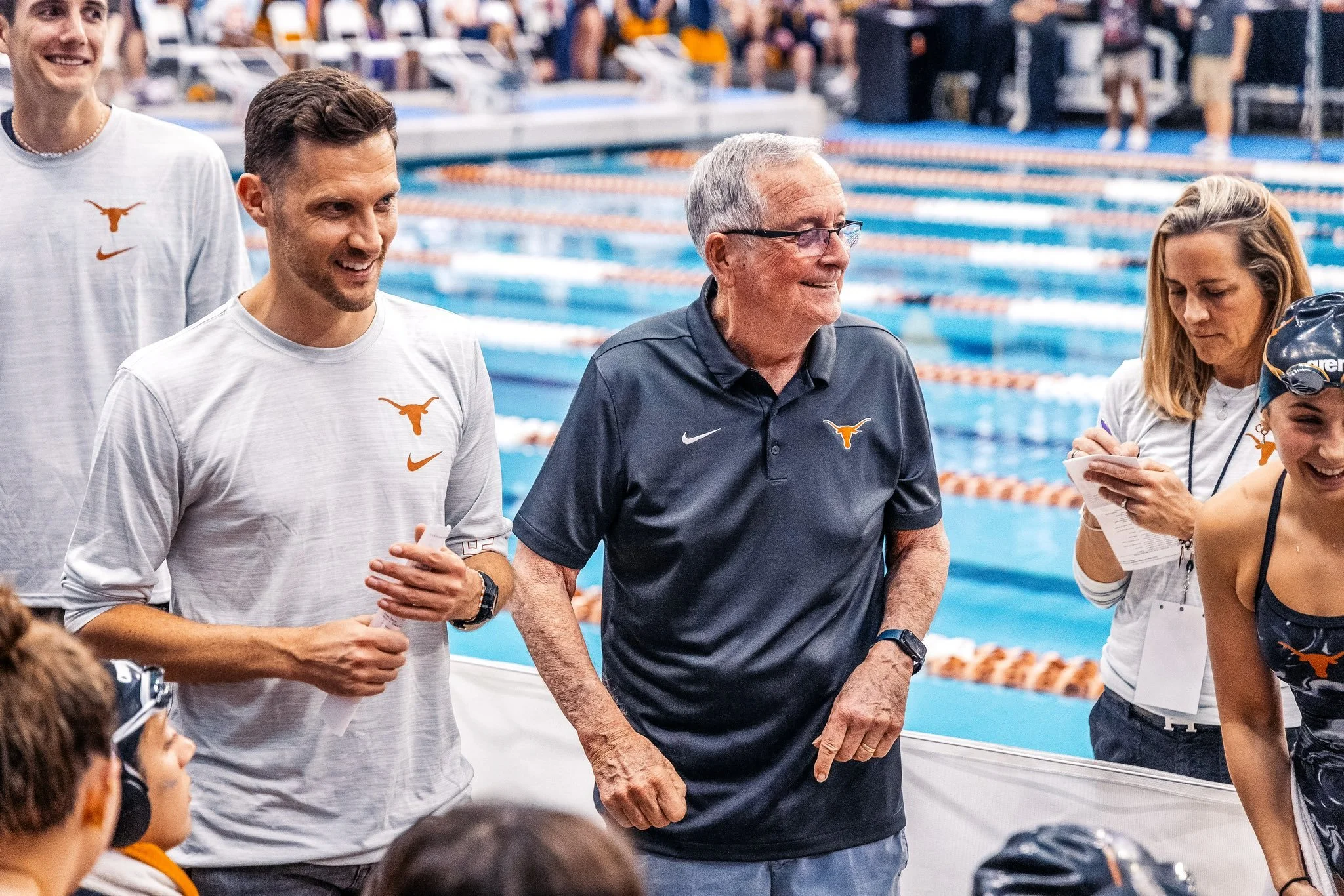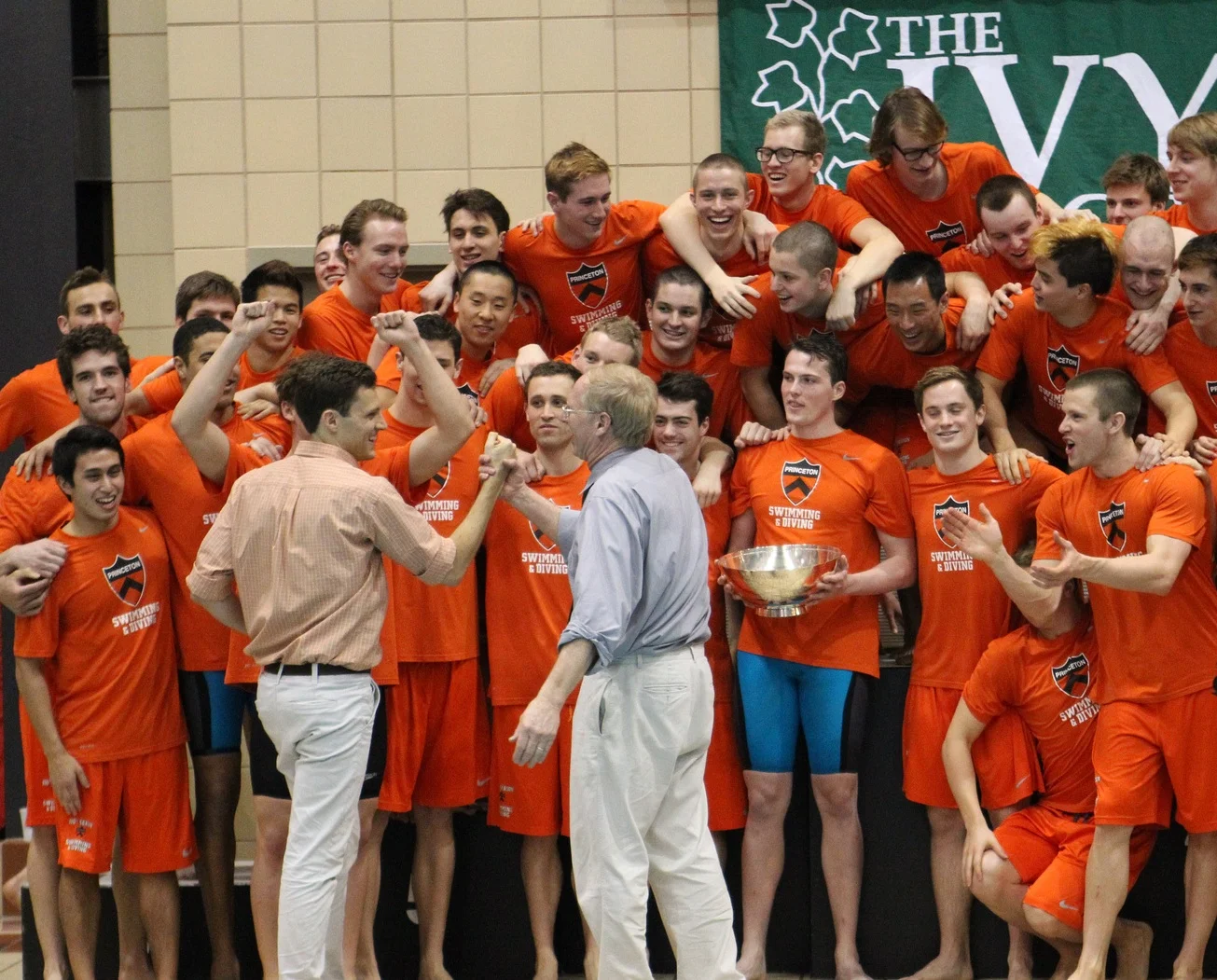Bio
As Associate Head Coach at the University of Texas, Mitch Dalton has worked alongside Carol Capitani to bring Texas Women’s Swimming back to national prominence. Together, they have led the Longhorns to consistent top finishes at the NCAA Championships, developed NCAA champions, and fostered a culture of excellence that continues to build on Texas’ storied legacy.
Before coming to Texas, Mitch served as the National Junior Team Director for USA Swimming, making him one of the youngest leaders in the organization’s history at age 31. His role was to identify and develop the future of the U.S. Olympic Swimming Team, and during his tenure, Team USA won every major junior international competitionacross four years.
Mitch’s collegiate coaching career took off at Princeton University, where he helped guide the team to four Ivy League Team Championships. His experience at the conference and international levels has shaped his approach to developing elite athletes and fostering team success.
Influences
Carol Capitani
Great coaching isn’t just about times on a scoreboard—it’s about taking care of people in ways that go beyond the pool. That’s what I’ve learned from Carol Capitani. She has a rare ability to make every person feel seen—whether it’s through a handwritten note, remembering something unique about someone, or finding a small but meaningful way to connect.
She fills people with confidence, not through empty words, but through the unwavering belief she has in them. She doesn’t just say, “You can do this”—she shows you why you can. She expects the work, she expects the belief, and because of that, people rise to meet those expectations.
She also isn’t afraid to bring her full self to the job. Carol doesn’t try to fit into a mold—she leads with authenticity. She’s real, she’s strong, and she never compromises who she is. That honesty creates trust, and that trust is what builds great teams.
And when the bullets are flying—when the pressure is high, and the stakes are real—Carol stays calm and strong. She doesn’t waver, and because of that, no one around her does either. That kind of steadiness, that kind of leadership, is something I carry with me every day.
Eddie Reese
15 NCAA team national championships, 45 consecutive conference championships, 29 Olympians, 63 Olympic medals (39 gold, 16 silver, 8 bronze), 54 NCAA individual champions, 41 national champion relays, and 219 All-Americans. Trying to learn from Eddie Reese is like trying to learn from the wind—it’s always moving, always shifting, and just when you think you’ve figured it out, he drops something on you that changes everything. He’s such an individual, so completely Eddie, that sometimes it feels impossible to follow in his footsteps. But if you pay attention—if you wait for those little moments—boom, something incredible lands.
One time, I thought I had written the perfect practice, and it was going horribly. Eddie walked by, and I asked him if that had ever happened to him. He just laughed and said, "Don’t be afraid to change it." Simple, direct, and exactly what I needed to hear. That’s Eddie.
His humor is part of what makes him so great. He makes the hardest things feel light. He never overcomplicates, never lets pressure get in the way of progress. And yet, behind every joke, every story, there’s a depth of wisdom that’s shaped the greatest swimmers in history.
More than anything, Eddie never settled. Eighty-one years old, countless NCAA titles, Olympic champions, record breakers—and still, he was always thinking about how people could get faster. Even the best in the world weren’t done in his eyes; there was always a way to be better.
And at the end of the day, through all the wins, all the records, all the legends he coached, Eddie always came back to this:
"Take care of each other, take care of yourself, and the rest will take care of itself."
That’s the lesson. The results, the success—it all follows when you commit to the people around you and to the work itself. Eddie Reese built champions, but more than that, he built a standard.
Rob Orr
The greatest man in coaching that no one talks about—and he probably wants it that way. Rob Orr never chased attention, but he built something legendary at Princeton. From him, I learned that coaching isn’t about being the loudest voice in the room; it’s about leading with authenticity and trusting the process enough to let the athletes take the wheel. He had a way of putting his swimmers in the driver’s seat, giving them ownership of their success while still holding the highest standards.
He understood that coaching isn’t about control—it’s about listening before taking action, about valuing the collective while still demanding the best from each individual. He never let high standards get in the way of humanity; in fact, they worked hand in hand.
Rob also taught me that humor matters. If you take yourself too seriously, you’ll miss the best parts of the job. He kept things light, but he never lost sight of the mission. He believed that to be great, you had to "Swim Fast to Swim Fast"—a simple phrase that carried a deeper truth: Speed comes from racing, competing, and embracing the moments that demand more from you.
And then there was the line he’d always say: "Coaching isn’t [just] coaching." It’s bigger than the sport. It’s mentorship, leadership, and learning how to be the kind of person others want to follow.
Things I did not learn from Rob? Technology. But in a world that obsesses over gadgets and analytics, Rob Orr built champions with something stronger—connection, wisdom, and belief. And I think that’s why his impact will last far beyond any swim meet or record board.
Susan Teeter
Not only is she one of the most successful coaches in **Ivy League history—any sport, any gender—**but she’s also one of the most impactful mentors in coaching. Teeter didn’t just build champions at Princeton; she built coaches, leaders, and professionals who carry her lessons far beyond the pool.
From her, I learned that conflict isn’t something to avoid—it’s something to lean into. Growth doesn’t happen in comfort, and the best leaders don’t shy away from the hard conversations. She taught me how to be a professional, to show up prepared (and early), and to challenge the status quo—because progress doesn’t come from following the script.
One of the things I admire most about Teeter? She was never afraid to do or say the hard, unpopular thing if it was the right thing to do—for her athletes, for the sport, or simply because it was right. She didn’t make decisions based on convenience or approval; she made them based on principles and what was best for the people she led.
She also showed me the power of alumni and the impact a coach can have far beyond someone’s years on a team.Princeton wasn’t just a program people swam for—it was a community that Teeter fostered, long after her athletes had left. The sense of tradition, belonging, and connection was palpable, and she was the thread that held it together. Seeing how invested her alumni were in the program showed me just how powerful a coach’s reach can be, not just in shaping athletes but in shaping lives.
And then there’s one of my favorite lessons from Teeter: never settle for a mediocre meal. It’s not just about food (though, with Teeter, it kind of is). It’s about having high standards in everything you do. Whether it’s coaching, relationships, or the way you carry yourself in the world, if you’re going to do something, do it well.
Teeter’s impact goes far beyond Princeton, and she continues to push people to be better, think bigger, and never settle. If you want to learn more about the woman behind the legacy, check out her work at S.S. Teeter Associates.
Russell Mark
If there is a cute-and-simple way to describe how influential Russell Mark has been on every Olympic Team’s performance since 2004; email me and it will be the opening line of this paragraph. While I am waiting, let me just say that from Russell I learned how to sharpen my technical swimming eye (from the world’s technique leader), incorporate data & technology into coaching, and create a performance plan for success in any situation. By far, the greatest lesson I have learned from Russell is the importance of investing in people and relationships. With the foundation of a strong personal or professional relationship, teams can move mountains. Not for nothing, but the guy was an actual rocket scientist…haven’t learned that part yet.
Mike & Sara Lombardi
Sara is an Olympic rower, mom, and total business baddie. Mike is an elite rower-turned elite coach-turned business school grad-turned dad and business ace. Before all of that, they were my roommates for four years. I think it’s rare that a personal relationship can have such a profound impact on your professional life. Living with Mike & Sara was the equivalent of a four-year immersive think tank experience in; high performance, teams and human dynamics, bio mechanics, sport and clinical psychology, nutrition and all around huntin’ for excellence. The three of us, in our mid-late 20s, lived, ate, breathed, personal growth and athletic excellence. If you want to see proof that greatness is achieved through discipline and mind-numbing consistency…live with an athlete trying to make the Olympics (and her fiance)! These two have taught me to think outside the box, dream big, that struggles don’t keep you down forever, never stop reading, never stop learning and to lead with love.







